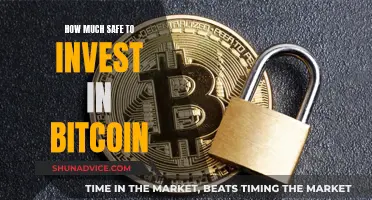
Dash, short for Digital Cash, is a decentralised cryptocurrency that has been around since 2014. Known for its focus on privacy and instantaneous transactions, Dash has a two-tier network system, with the second tier consisting of masternodes that facilitate functions such as PrivateSend and InstantSend. With its unique features and well-structured tokenomics system, Dash has established itself as a pioneering cryptocurrency. But is it a good investment?
| Characteristics | Values |
|---|---|
| Launch date | January 2014 |
| Founders | Evan Duffield and Kyle Hagan |
| Original name | XCoin |
| Current price | $23.88 USD |
| 24-hour trading volume | $33,174,218 USD |
| Market cap rank | #163 |
| Market cap | $285,079,542 USD |
| Circulating supply | 11,938,423 DASH coins |
| Max supply | 18,900,000 DASH coins |
| Price history | Experienced significant fluctuations, reaching an all-time high of around $1,600 in December 2017. The price has been generally volatile since then, with a steep decline from its all-time high. |
| Main features | Two-tier network, PrivateSend, InstantSend, ChainLocks, low transaction fees |
| Benefits | Enhanced user privacy, speed and efficiency, community-driven governance, accessibility and usability, stability and security |
| Block reward distribution | 45% to miners, 45% to masternodes, 10% to the dash treasury |
| Investment potential | Dash has innovative features, a resilient market performance, and a well-structured tokenomics system. It has the potential to disrupt the payments industry in the next 5-10 years. However, it has significantly declined from its peak, and regulatory concerns exist, so investors should proceed with caution. |
What You'll Learn

Dash's unique features
Dash, or Digital Cash, is a decentralised cryptocurrency that was launched in 2014. It is built upon Bitcoin's core code with added features that enhance privacy and speed. Here are some of Dash's unique features:
Two-Tier Network System
Dash operates on a two-tier network that sets it apart from many other cryptocurrencies. The first tier consists of miners who secure the network and record transactions on the blockchain. The second tier is made up of masternodes, which are responsible for governance and enabling special functions, such as InstantSend and PrivateSend.
Masternodes
Masternodes are powerful servers that host full copies of the Dash blockchain. They provide advanced functions and services to the Dash network, such as InstantSend and CoinJoin. Operators of masternodes receive regular payments and can vote on community projects. To become a masternode, one must hold 1000 DASH as collateral in their system.
PrivateSend
PrivateSend is a signature feature of Dash that ensures transaction privacy. It breaks down transactions into standard denominations and uses masternodes to shuffle inputs, providing users with the same anonymity as cash withdrawn from an ATM. This process makes it nearly impossible to trace the source of funding, enhancing financial privacy.
InstantSend
Dash introduced InstantSend to facilitate immediate transactions. This feature uses masternodes to verify transactions and lock the inputs, promising quick inclusion in subsequent blocks. The average transaction speed is approximately 1.8 seconds, allowing Dash to compete with nearly instantaneous transaction systems like credit cards.
Community-Driven Governance
Dash's governance model is decentralised and encourages active community participation. Decisions are made via a blockchain, and the system includes standard nodes and miners. This democratic approach ensures that the direction and development of Dash align with the needs and wishes of its users, fostering a more engaged and committed community.
Mandela Gold Coins: Smart Investment or Risky Bet?
You may want to see also

Price predictions
Dash, short for Digital Cash, is a decentralised cryptocurrency with a focus on privacy and instantaneous transactions. It was launched in 2014 as a fork of Litecoin (LTC) and Bitcoin (BTC) and has since grown to include features such as a two-tier network, PrivateSend, InstantSend, and ChainLocks.
DigitalCoinPrice Prediction
The DigitalCoinPrice prediction for Dash shows a potential for growth in the coming years.
- 2023: Projected at $56.41
- 2025: Expected to increase to $91.29
- 2027: Predicted to climb to $115.71
- 2030: A substantial leap to $270.99, reflecting long-term optimism
Priceprediction.net Prediction
Priceprediction.net provides a more conservative forecast for Dash:
- 2023: $36.81
- 2025: $76.21, indicating an upward trajectory
- 2027: Jumps to $159.32, showing expectations for aggressive growth
- 2030: Estimated at $483.87, reflecting a bullish long-term view
Wallet Investor Prediction
Wallet Investor, a website that provides price predictions and analysis, had a low price target for Dash, implying a bearish market in the coming years. By 2025, they expect the peak to reach $440.
Technical Analysis Prediction
Based solely on technical factors and chart analysis, here are some predictions for Dash's price movement:
- 2022-2023: Up to a 50% rise projection
- 2024-2025: A 200% rising trend, but this projection is considered inaccurate as it is based on crypto market development.
While these predictions provide some insight, it is important to remember that the cryptocurrency market is highly volatile, and past performance does not guarantee future results. Always conduct thorough research and consider your risk tolerance before investing.
Gold Coin Investment: A Guide to Smart Buying
You may want to see also

Market performance
Dash, short for Digital Cash, is a decentralised cryptocurrency with a focus on privacy and instantaneous transactions. It was launched in 2014 as a fork of Litecoin (LTC) and Bitcoin (BTC) and has since grown to include features such as a two-tier network, incentivised nodes, and decentralised project governance.
Dash's price has experienced significant fluctuations since its launch. In August 2016, the price of Dash was $12. The following year, in 2017, the price soared to an all-time high of around $1,600 per coin during the crypto market boom. However, this high was not sustained, and the price plummeted during the bear market in 2018, reaching a low of $65.
Dash's price continued to fluctuate in the following years, with a mix of highs and lows. In 2020, the price surged back above the $100 level, giving investors renewed hope. The price increase hit $450 last year but failed to set a new record. As of 2024, Dash's price has been volatile, ranging between $20 to $300, with a live price of $23.88 as of August 2024. This price is substantially lower than its peak, indicating a substantial decrease in value.
Despite the recent decline, Dash has a strong possibility of disrupting the payments industry in the next five to ten years. Its ability to provide quick, private, and secure digital cash solutions, coupled with its focus on user experience, positions it as a competitive alternative to traditional online payment methods.
Various sources have made central price projections for Dash, with some predicting a potential for growth. DigitalCoinPrice, for example, forecasts Dash's price to reach $270.99 by 2030. However, it is important to remember that the cryptocurrency market is highly volatile, and past performance does not guarantee future results.
In summary, Dash's market performance has been characterised by significant price fluctuations, with a general downward trend since its peak in 2017. While it has innovative features and shows potential for disrupting the payments industry, investors should carefully consider the inherent volatility and risks associated with the cryptocurrency market before making any investment decisions.
Amazon Bitcoin: A Guide to Investing
You may want to see also

Regulatory concerns
Dash, short for Digital Cash, is a decentralised cryptocurrency with a focus on privacy and instantaneous transactions. It was launched in 2014 as a fork of Litecoin (LTC) and Bitcoin (BTC), with the goal of improving upon them by providing stronger privacy and faster transactions.
While Dash has established itself as a prominent name in the crypto space, there are regulatory concerns surrounding its privacy features and potential for facilitating illegal activities. Here is an in-depth look at these regulatory concerns:
The privacy features offered by Dash, such as PrivateSend and masternodes, have raised concerns among regulators and authorities. These features enable users to maintain a high level of anonymity and make it difficult to trace transactions. While enhanced privacy is a key selling point for Dash users, it also presents challenges for regulatory compliance and oversight.
At the core of the regulatory concerns is the potential for Dash to be used in illicit activities. The anonymous nature of transactions could attract individuals or entities looking to conceal their financial activities, including money laundering, tax evasion, or even financing criminal operations. Regulators are tasked with the challenge of monitoring and preventing the use of cryptocurrencies for illegal purposes, and Dash's privacy features complicate this effort.
The regulatory scrutiny of Dash is not just theoretical; it has already faced pushback from authorities in certain jurisdictions. For example, in 2021, the United Kingdom's Financial Conduct Authority (FCA) issued a ban on UK-based crypto exchanges dealing in privacy coins, specifically naming Dash as one of the affected cryptocurrencies. This ban was implemented due to concerns over money laundering and terrorist financing risks associated with these privacy coins.
Moreover, Dash's decentralised nature and lack of central authority or intermediaries make it even more challenging for regulators to enforce existing financial laws and regulations. The distributed ledger system, while providing transparency at the technical level, can obfuscate the identities of users, making it difficult to hold individuals accountable for their actions.
The regulatory landscape for cryptocurrencies is still evolving, and it is likely that privacy-focused coins like Dash will face increasing scrutiny as authorities strive to balance innovation with consumer protection and security. This could lead to stricter regulations, reporting requirements, or even potential bans in certain jurisdictions.
As a result, investors considering Dash should be mindful of the regulatory environment and the potential impact on the coin's adoption and value. While Dash's privacy features are appealing to those seeking anonymity, they also attract the attention of regulators, which could result in increased volatility and risk for investors. Therefore, it is essential to carefully consider these regulatory concerns and stay informed about any regulatory developments that may affect Dash's standing in the market.
A Beginner's Guide to Investing in Bitcoin on Robinhood
You may want to see also

Masternodes
Dash, or Digital Cash, is a decentralised cryptocurrency that was launched in 2014. It is built upon Bitcoin's core code but with added features like PrivateSend and InstantSend that enhance user privacy and transaction speed.
Dash operates on a two-tier network, with the first tier composed of miners who secure the network and write transactions to the blockchain. The second tier consists of masternodes, which are powerful servers that host full copies of the Dash blockchain. These masternodes are responsible for governance and enabling special functions within the network, such as InstantSend and CoinJoin, as well as usernames on the blockchain.
The two-tier network, with its masternodes, gives rise to several features that are not available on conventional blockchains. These include enhanced transaction speed, privacy, and security, making Dash a unique and innovative cryptocurrency.
TheStreet's Guide to Investing in Bitcoin
You may want to see also
Frequently asked questions
Dash, short for Digital Cash, is a decentralised cryptocurrency known for its focus on privacy and instantaneous transactions. It was launched in 2014 and is built upon Bitcoin's core code with added features like PrivateSend and InstantSend, which enhance privacy and speed.
Dash has established itself as a distinguished cryptocurrency by offering a set of unique benefits tailored to the needs of both casual users and serious investors. These include enhanced user privacy, speed and efficiency, community-driven governance, accessibility and usability, and stability and security. Dash also has a well-structured tokenomics system and is marketed to both individual users and institutions, including merchants, financial services, and traders.
Dash's significant decline from its peak price, high volatility, and regulatory concerns underscore the need for cautious consideration. The complexity of its two-tier network and privacy features may attract scrutiny and raise centralisation concerns. Additionally, Dash faces competition from similar cryptocurrencies, and there are risks associated with the inherent volatility and speculative nature of the cryptocurrency market.







